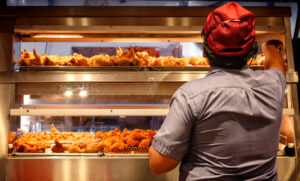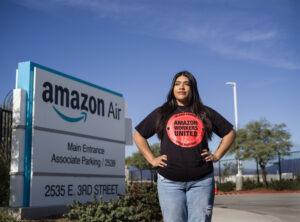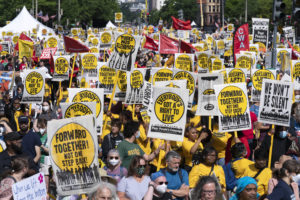Marie Cocco: Waging Past Minimum
A measure to raise the minimum wage is the rare ballot option that isn't a choice between the lesser of two evils.WASHINGTON — By Linda Carrillo’s account, she once had it all: a husband, a home, a profitable translation business, credit cards, plenty of travel, a cat and a dog. “I never lacked anything,” she recalls. “If I saw something I liked, I would purchase it.”
Carrillo’s journey from middle-class contentment to minimum-wage poverty is too typical. Her husband was an alcoholic who descended into drug abuse and bouts of violence that finally landed Carrillo in the hospital. From there she picked herself up — only to be laid low.
Her flight from abuse took her to Arizona, where low-wage work was plentiful but low rents were not. Her stint as a convenience store clerk barely supported her and her teenage son. But the layoff from that job — without a day’s notice — sent her scrambling. The first job she found was as a hostess in a diner. The work featured long hours, a boss who came on to the prettier waitresses, and demands that Carrillo do double and triple duty manning the dishwasher, helping the busboys and filling in for absent waitresses, all while she kept an eye out for customers who waited to be seated. The pay: $5.50 an hour, barely above the federal minimum wage of $5.15.
“I never made enough to pay the rent, to buy groceries, to buy anything,” Carrillo, 50, recalled in an interview. She moved with her son, Alex, into a homeless shelter, where she was grateful for the food and especially for the bus service the state provided to get her son to school. Eventually Carrillo found new work — for three different home healthcare companies — as a caretaker for disabled patients.
She now works seven days a week, including overnight shifts every Saturday and Sunday. At rates that range from $8.50 to $12 an hour, the work has allowed Carrillo to move into a one-bedroom apartment in Mesa, Ariz., and to feed her son. She attends school part-time to become a medical assistant.
Her time at the bottom turned Carrillo into an unlikely activist. She is working, when she can spare a minute, with the grass-roots anti-poverty organization ACORN to pass a state ballot initiative to raise the minimum wage.
Next week, voters in Arizona and five other states will decide whether to raise the wages of the nation’s poorest workers. Polls show that “minimum wage” may well be the most popular name on the ballot. It’s supported by about 70 percent of voters in states as geographically and politically dissimilar as Arizona, Colorado, Ohio, Nevada, Montana and Missouri. If, as expected, the ballot measures in all these states pass, a majority of states — from the politically reddest to those that typically vote true blue — will have raised the wage floor on their own.
This is a primal scream against political inertia. Congress last raised the minimum wage in 1997. Adjusted for inflation, its value stands where it was in 1955. Republican leaders made a counterfeit gesture last session toward raising it — linking the wage hike with another cut in the estate tax for heirs of the richest Americans. The measure died the ignoble death it deserved.
There’s rich irony in the wishes of Senate Republican leader Bill Frist, who told New Hampshire journalists recently that voters shouldn’t focus on Iraq or terrorism, but on “pocketbook issues.” Distress at the hard lives of low-wage workers is probably not what feeds the economic gloom that pervades most polls. More likely, it’s stagnant wages for the middle class, escalating healthcare costs and the hangover from having paid super-high gasoline prices last summer. “You can’t underestimate the impact that high gasoline prices had on people,” says pollster Andrew Kohut, president of the Pew Research Center.
In Arizona, Carrillo often asks middle-income people what they earn, and if they can make ends meet. “They usually say, ‘Oh, we’re having such a hard time.’ And I say, ‘How would you like to earn $5.50 an hour? How would you like to not be able to feed your son?’ I cried a lot when I was making that because my son wanted potato chips and I would have to say I can’t afford that.”
Too often, a trip to the voting booth requires a choice between a bad candidate and a worse one. Perhaps the drive to raise the minimum wage is remarkably popular because it provides something truly rare: a chance to vote on doing good.
Marie Cocco’s e-mail address is mariecocco(at symbol)washpost.com.
(c) 2006, Washington Post Writers Group
Your support matters…Independent journalism is under threat and overshadowed by heavily funded mainstream media.
You can help level the playing field. Become a member.
Your tax-deductible contribution keeps us digging beneath the headlines to give you thought-provoking, investigative reporting and analysis that unearths what's really happening- without compromise.
Give today to support our courageous, independent journalists.






You need to be a supporter to comment.
There are currently no responses to this article.
Be the first to respond.